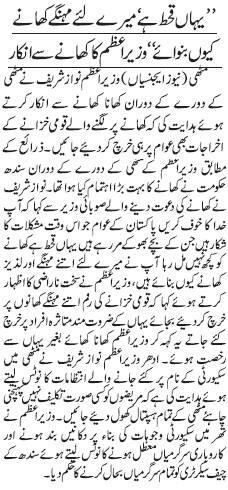THE HAGUE:
Prime Minister Nawaz Sharif appealed on Monday for international cooperation and assistance that will give his country access to nuclear technology for a civilian energy programme — the lynchpin of its strategy to overcome chronic energy shortages.
“Energy deficit is one of the most serious crises facing Pakistan,” PM Nawaz told delegates at the third Nuclear Security Summit in The Hague. “As we revive our economy, we look forward to international cooperation and assistance for nuclear energy under IAEA safeguards,” he said.

Leaders from 53 countries, US, EU, International Atomic Energy Agency and Interpol are attending the nuclear summit.
The prime minister also called for Pakistan’s inclusion in all international export control regimes, especially the Nuclear Suppliers Group. International treaties and forums, according to him, should supplement national actions to fortify nuclear security.
At the same time he reiterated “the highest importance” that his country attached to nuclear security. because it was directly linked to the country’s national security.
“Pakistan is a responsible nuclear weapons state and pursues a policy of nuclear restraint, as well as credible minimum deterrence,” he said.
“Our region needs peace and stability for economic development that benefits its people. That is why, I strongly advocate nuclear restraint, balance in conventional forces and ways to resolve conflicts,” the prime minister said.
The prime minister paid tribute to US President Barack Obama for launching
the nuclear security summit process four years ago. Pakistan has been running a safe, secure and safeguarded civil nuclear programme for more than 40 years and the country has the expertise, manpower and infrastructure to produce civil nuclear energy.
Eminently qualified
Pakistan’s nuclear security is supported by five pillars – a strong command and control system led by the National Command Authority; an integrated intelligence system; a rigorous regulatory regime; a comprehensive export control regime; and active international cooperation. Pakistan’s security regime covers physical protection, material control and accounting, border controls and radiological emergencies.
The prime minister said Pakistan regularly submitted reports to the UN Security Council 1540 Committee on the measures the country has taken to exercise control over transfer of sensitive materials and technologies.
“Looking back, we can say with confidence that our decisions and commitments have spurred national action, promoted international cooperation and fostered nuclear security culture,” the prime minister said, adding that Pakistan has constructively contributed to this process.
He said Pakistan’s nuclear materials, facilities and assets were safe and secure and the country’s nuclear security regime was anchored in the principle of multi-layered defence for the entire spectrum – insider, outsider or cyber threat.
Islamabad has established a centre of excellence that conducts intense specialised courses in nuclear security, physical protection and personnel reliability, he said, adding that Pakistan was ready to share its best practices and training facilities with other interested states in the region and beyond.
Dealing with radiological threats
He said his country had also deployed radiation detection mechanisms at several exit and entry points to prevent illicit trafficking of radioactive and nuclear materials.
Similarly, he said, all countries should continue to take measures to secure their nuclear facilities and materials and prevent any perceived nuclear terrorist threat. “We all need radioactive sources for hospitals, industry and research; but should be vigilant about radiological threats,” he added.
Published in The Express Tribune, March 25th, 2014.


